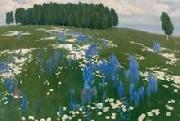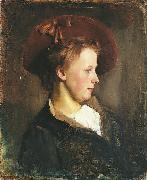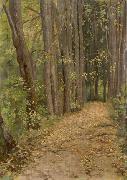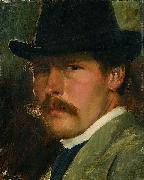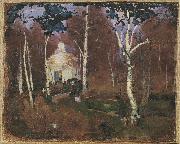Paul Raud Oil Painting ReproductionAll Paul Raud Oil Paintings(22 October 1865 in Kirikukela, Viru-Jaagupi Parish C 22 November 1930 in Tallinn) was an Estonian painter. The twin brother of painter Kristjan Raud, he studied in Desseldorf beginning in 1886, becoming influenced by the work of Eduard Gebhardt. After his return to Estonia, he painted mainly portrait commissions for some time, before traveling with his brother and Amandus Adamson to the islands of Muhu and Pakri in 1896. His works of this period are reminiscent of those of Max Liebermann. In 1899 he returned to work in Germany, taking on some of the stylistic trappings of Impressionism; this, coupled with time spent working with Ilya Repin, influenced his later style. Later in his career, most especially during and after World War I, he began to teach, from 1915 working as a drawing instructor at the Tallinn Institute of Commerce and from 1923 at the State School of Industrial Art in Tallinn. |
|||

|
|||
|
|
|||
|
||||||||
| Paul Raud (22 October 1865 in Kirikukela, Viru-Jaagupi Parish C 22 November 1930 in Tallinn) was an Estonian painter. The twin brother of painter Kristjan Raud, he studied in Desseldorf beginning in 1886, becoming influenced by the work of Eduard Gebhardt. After his return to Estonia, he painted mainly portrait commissions for some time, before traveling with his brother and Amandus Adamson to the islands of Muhu and Pakri in 1896. His works of this period are reminiscent of those of Max Liebermann. In 1899 he returned to work in Germany, taking on some of the stylistic trappings of Impressionism; this, coupled with time spent working with Ilya Repin, influenced his later style. Later in his career, most especially during and after World War I, he began to teach, from 1915 working as a drawing instructor at the Tallinn Institute of Commerce and from 1923 at the State School of Industrial Art in Tallinn. |
||||||||
|
|
||||||||
| Gemälde IDENTIFIZIERUNG:: 74644 Field of flowers English: Field of flowers, 1906-1911. Oil cyf |
||||||||
|
|
||||||||
| Gemälde IDENTIFIZIERUNG:: 79498 A Lady in a Red Hat 1893(1893) Oil on canvas 61 x 50 cm (24 x 19.7 in) cjr |
||||||||
|
|
||||||||
| Gemälde IDENTIFIZIERUNG:: 91555 a road in park Oil on canvas. 34.2 x 24.2 cm 1910 cjr |
||||||||
|
|
||||||||
| Gemälde IDENTIFIZIERUNG:: 92390 Self-Portrait with a Hat Date 1900(1900) Medium oil on canvas Dimensions 28.1 X 22.4 cm (11.1 X 8.8 in) ttd |
||||||||
|
|
||||||||
| Gemälde IDENTIFIZIERUNG:: 93800 At the Rakvere Cemetery 1895(1895) Medium oil on canvas Dimensions 24 x 30.5 cm (9.4 x 12 in) cjr |
||||||||
|
|
||||||||
| VORHERIGER KÜNSTLER NÄCHSTER KÜNSTLER | ||||||||
|
|
||||||||
|
Paul Raud (22 October 1865 in Kirikukela, Viru-Jaagupi Parish C 22 November 1930 in Tallinn) was an Estonian painter. The twin brother of painter Kristjan Raud, he studied in Desseldorf beginning in 1886, becoming influenced by the work of Eduard Gebhardt. After his return to Estonia, he painted mainly portrait commissions for some time, before traveling with his brother and Amandus Adamson to the islands of Muhu and Pakri in 1896. His works of this period are reminiscent of those of Max Liebermann. In 1899 he returned to work in Germany, taking on some of the stylistic trappings of Impressionism; this, coupled with time spent working with Ilya Repin, influenced his later style. Later in his career, most especially during and after World War I, he began to teach, from 1915 working as a drawing instructor at the Tallinn Institute of Commerce and from 1923 at the State School of Industrial Art in Tallinn. |
||||||||
|
|
||||||||
|
KONTAKTIEREN Sie UNS |





